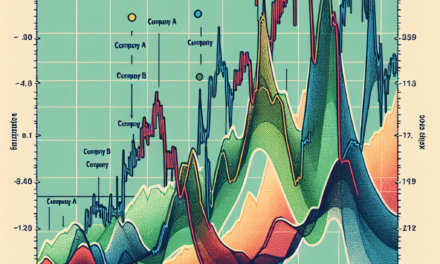“October Turmoil: European Stock Market Woes Rattle Hedge Funds, Says Goldman Sachs”
Introduction
In October, the European stock market faced significant challenges, impacting hedge funds across the region, according to a report by Goldman Sachs. The volatility and downturn in European equities have been attributed to a combination of geopolitical tensions, economic uncertainties, and fluctuating investor sentiment. These factors have collectively exerted pressure on hedge funds, which have struggled to navigate the turbulent market conditions. The report highlights the difficulties faced by fund managers in maintaining performance amidst the broader market instability, underscoring the complex landscape that investors are currently navigating in Europe.
Impact Of European Stock Market Decline On Hedge Fund Performance
In October, the European stock market experienced a significant downturn, which has had a profound impact on hedge fund performance, as reported by Goldman Sachs. This decline in the market has been attributed to a confluence of factors, including geopolitical tensions, economic uncertainties, and fluctuating energy prices. As these elements converged, they created a challenging environment for hedge funds, which are traditionally known for their ability to navigate volatile markets. However, the recent market conditions have tested even the most seasoned fund managers, leading to a notable decline in hedge fund performance across the region.
One of the primary drivers of the European stock market’s decline has been the ongoing geopolitical tensions, particularly those involving Russia and Ukraine. The conflict has not only disrupted trade and investment flows but has also led to increased volatility in energy prices, given Europe’s reliance on Russian energy supplies. This volatility has, in turn, affected various sectors, including manufacturing and transportation, which are heavily dependent on stable energy costs. Consequently, hedge funds with significant exposure to these sectors have faced substantial losses, as their investment strategies have been undermined by the unpredictable market conditions.
Moreover, economic uncertainties have further exacerbated the situation. The European Central Bank’s monetary policy decisions, aimed at curbing inflation, have led to rising interest rates, which have put additional pressure on businesses and consumers alike. This tightening of monetary policy has resulted in reduced consumer spending and lower corporate earnings, both of which have negatively impacted stock prices. Hedge funds, which often rely on leveraged positions to amplify returns, have found themselves in a precarious position as borrowing costs have increased, thereby eroding potential profits.
In addition to these challenges, the fluctuating energy prices have also played a significant role in the market’s decline. The transition to renewable energy sources, while necessary for long-term sustainability, has introduced short-term disruptions in energy supply chains. These disruptions have led to price volatility, which has been difficult for hedge funds to predict and manage. As a result, funds with investments in energy-dependent industries have seen their portfolios suffer, further contributing to the overall decline in performance.
Despite these challenges, some hedge funds have managed to weather the storm better than others. Those with diversified portfolios and adaptive strategies have been able to mitigate some of the losses by reallocating assets and adjusting their investment approaches. For instance, funds that have shifted their focus towards sectors less affected by energy price volatility, such as technology and healthcare, have fared relatively better. Additionally, funds that have employed sophisticated risk management techniques, including the use of derivatives and hedging strategies, have been able to cushion the impact of the market downturn.
In conclusion, the European stock market’s decline in October has posed significant challenges for hedge funds, as reported by Goldman Sachs. The combination of geopolitical tensions, economic uncertainties, and fluctuating energy prices has created a complex and volatile environment that has tested the resilience of even the most experienced fund managers. While some funds have managed to adapt and mitigate losses, the overall impact on hedge fund performance has been substantial. As the market continues to navigate these turbulent times, hedge funds will need to remain agile and innovative in their strategies to overcome the ongoing challenges and capitalize on potential opportunities.
Strategies Hedge Funds Are Using To Navigate European Market Challenges
In October, the European stock market faced significant challenges, leading to notable repercussions for hedge funds operating within the region. According to a report by Goldman Sachs, these market difficulties have prompted hedge funds to reassess and adapt their strategies in order to navigate the turbulent financial landscape. As the European market continues to grapple with economic uncertainties, hedge funds are employing a variety of strategies to mitigate risks and capitalize on potential opportunities.
One of the primary strategies being utilized by hedge funds is diversification. By spreading investments across a range of asset classes and geographic regions, hedge funds aim to reduce their exposure to the volatility of the European market. This approach not only helps in managing risk but also allows funds to tap into growth opportunities in other parts of the world. For instance, some hedge funds are increasing their allocations in emerging markets, which are perceived to offer higher growth potential compared to the stagnating European economies.
In addition to diversification, hedge funds are increasingly relying on quantitative strategies to navigate the current market challenges. These strategies involve the use of complex mathematical models and algorithms to identify trading opportunities and manage risk. By leveraging data analytics and machine learning, hedge funds can make more informed investment decisions, thereby enhancing their ability to generate returns even in a volatile market environment. This shift towards data-driven decision-making reflects a broader trend in the financial industry, where technology is playing an increasingly pivotal role.
Moreover, hedge funds are also focusing on short-selling strategies to profit from declining stock prices. Given the current economic climate in Europe, characterized by sluggish growth and geopolitical tensions, many hedge funds see short-selling as a viable strategy to hedge against potential losses. By betting against overvalued stocks or sectors that are likely to underperform, hedge funds can potentially offset losses from other investments. This approach, however, requires careful analysis and timing, as short-selling carries its own set of risks.
Furthermore, some hedge funds are turning to alternative investments such as private equity, real estate, and infrastructure projects. These asset classes are often less correlated with traditional stock markets, providing a buffer against market volatility. By investing in tangible assets with long-term growth potential, hedge funds can achieve a more balanced portfolio that is better equipped to withstand economic downturns. This strategy also aligns with the growing interest in sustainable and impact investing, as many alternative investments focus on projects with positive social and environmental outcomes.
In conclusion, the challenges facing the European stock market have compelled hedge funds to adopt a range of strategies to navigate the uncertain financial landscape. Through diversification, quantitative strategies, short-selling, and alternative investments, hedge funds are seeking to manage risk and uncover new opportunities for growth. As the market continues to evolve, these strategies will likely play a crucial role in determining the success of hedge funds in Europe. By staying agile and responsive to market conditions, hedge funds can better position themselves to weather the current storm and emerge stronger in the long run.
Analysis Of Goldman Sachs Report On October’s Market Woes
In October, the European stock market experienced significant turbulence, a development that has not gone unnoticed by financial analysts and investors alike. According to a recent report by Goldman Sachs, this volatility has had a pronounced impact on hedge funds, which have been grappling with the challenges posed by the fluctuating market conditions. The report provides a comprehensive analysis of the factors contributing to the market’s instability and the subsequent repercussions for hedge funds operating within this financial landscape.
To begin with, the report highlights several macroeconomic factors that have contributed to the European stock market’s woes. Chief among these is the ongoing uncertainty surrounding geopolitical tensions, which have been exacerbated by recent developments in international trade relations. This uncertainty has led to a lack of investor confidence, resulting in increased market volatility. Furthermore, the report points to the tightening of monetary policies by central banks across Europe as another critical factor. As interest rates rise, borrowing costs increase, which can dampen corporate earnings and, in turn, affect stock prices.
In addition to these macroeconomic influences, the report also delves into sector-specific challenges that have further compounded the difficulties faced by hedge funds. For instance, the energy sector has been particularly hard hit due to fluctuating oil prices and the transition towards renewable energy sources. This shift has created a complex environment for hedge funds that have traditionally relied on energy stocks as a stable investment. Similarly, the technology sector, which has been a significant driver of growth in recent years, has faced its own set of challenges. Regulatory pressures and supply chain disruptions have led to a reevaluation of tech stocks, contributing to the overall market instability.
As a result of these multifaceted challenges, hedge funds have found themselves in a precarious position. The Goldman Sachs report notes that many hedge funds have struggled to generate positive returns in October, with some even experiencing significant losses. This is particularly concerning given that hedge funds are typically seen as vehicles for managing risk and generating returns in volatile markets. The report suggests that the traditional strategies employed by hedge funds may no longer be sufficient in navigating the current market environment.
In response to these challenges, the report indicates that hedge funds are increasingly looking towards alternative strategies to mitigate risk and capitalize on potential opportunities. For example, some funds are diversifying their portfolios by investing in non-traditional assets such as cryptocurrencies and private equity. Others are adopting more sophisticated risk management techniques, including the use of derivatives and hedging strategies, to protect against downside risks.
Moreover, the report emphasizes the importance of agility and adaptability in the face of market uncertainty. Hedge funds that can quickly adjust their strategies in response to changing market conditions are more likely to weather the storm and emerge stronger in the long run. This adaptability is crucial, as the report predicts that the volatility in the European stock market is likely to persist in the coming months.
In conclusion, the Goldman Sachs report provides a detailed analysis of the challenges facing hedge funds in the wake of October’s European stock market woes. By examining the macroeconomic and sector-specific factors contributing to market instability, the report underscores the need for hedge funds to adopt innovative strategies and remain agile in an ever-changing financial landscape. As the market continues to evolve, the ability to navigate these complexities will be essential for hedge funds seeking to achieve sustainable success.
Historical Context: European Stock Market Volatility And Hedge Funds

The European stock market has long been a dynamic and sometimes volatile arena, with its fluctuations often reflecting broader economic trends and geopolitical developments. Historically, periods of volatility in the European markets have posed significant challenges for hedge funds, which are investment vehicles designed to generate returns regardless of market conditions. However, the intricate relationship between market volatility and hedge fund performance is complex, as these funds employ a variety of strategies to navigate turbulent times. In October, Goldman Sachs reported that the European stock market’s recent woes have once again put hedge funds to the test, highlighting the enduring impact of market volatility on these financial entities.
To understand the current situation, it is essential to consider the historical context of European stock market volatility. Over the past few decades, the European markets have experienced several periods of significant upheaval. Events such as the 2008 financial crisis, the Eurozone debt crisis, and the uncertainty surrounding Brexit have all contributed to heightened volatility. During these times, hedge funds have often found themselves at a crossroads, needing to adapt quickly to protect their investments and capitalize on new opportunities. The strategies employed by hedge funds during such periods have varied widely, ranging from short selling and leverage to more conservative approaches like diversification and risk management.
In October, the European stock market faced a confluence of factors that contributed to its instability. Economic concerns, including inflationary pressures and energy supply issues, were exacerbated by geopolitical tensions and policy uncertainties. These elements combined to create a challenging environment for investors, with market indices experiencing sharp fluctuations. For hedge funds, this volatility presented both risks and opportunities. On one hand, the rapid changes in stock prices offered potential for profit through strategic trading. On the other hand, the unpredictability of the market made it difficult to maintain consistent returns, particularly for funds with significant exposure to European equities.
Goldman Sachs’ report on the impact of these market conditions on hedge funds provides valuable insights into how these investment vehicles are navigating the current landscape. The report indicates that while some hedge funds have managed to capitalize on the volatility, others have struggled to adapt their strategies effectively. This divergence in performance underscores the importance of flexibility and innovation in hedge fund management. Those funds that have successfully weathered the storm have often done so by employing a diverse range of strategies, including quantitative analysis, macroeconomic forecasting, and active risk management.
Moreover, the report highlights the role of technology and data analytics in helping hedge funds respond to market volatility. Advanced algorithms and real-time data analysis have become crucial tools for fund managers, enabling them to make informed decisions quickly and efficiently. This technological edge has allowed some hedge funds to gain a competitive advantage, even in the face of challenging market conditions.
In conclusion, the recent volatility in the European stock market has once again underscored the complex relationship between market fluctuations and hedge fund performance. As history has shown, periods of instability present both challenges and opportunities for these investment vehicles. The ability of hedge funds to navigate such environments successfully depends on their adaptability, strategic innovation, and effective use of technology. As the European markets continue to evolve, hedge funds will need to remain vigilant and responsive to maintain their competitive edge and achieve their investment objectives.
Investor Reactions To European Market Downturn In October
In October, the European stock market experienced a significant downturn, which has had a profound impact on hedge funds, as reported by Goldman Sachs. This decline has prompted a wave of reactions from investors, who are now grappling with the implications of these market fluctuations. The downturn in the European stock market can be attributed to a confluence of factors, including geopolitical tensions, economic uncertainties, and fluctuating energy prices. These elements have collectively contributed to a volatile market environment, causing investors to reassess their strategies and risk exposures.
As the European market faced these challenges, hedge funds, which are typically known for their ability to navigate complex market conditions, found themselves in a precarious position. The sharp decline in stock prices has led to significant losses for many hedge funds, particularly those with substantial exposure to European equities. This has raised concerns among investors about the resilience of these funds and their ability to deliver returns in such a turbulent market. Consequently, investors are now scrutinizing the performance of hedge funds more closely, seeking to understand the underlying factors that have contributed to their recent struggles.
In response to the market downturn, some investors have opted to diversify their portfolios, shifting their focus away from European equities and towards other asset classes that may offer more stability. This includes increasing allocations to fixed-income securities, commodities, and alternative investments, which are perceived as safer havens in times of market uncertainty. Additionally, investors are paying closer attention to macroeconomic indicators and geopolitical developments, as these factors are likely to influence market dynamics in the coming months.
Moreover, the recent market turmoil has prompted investors to reevaluate their risk management strategies. Many are now placing a greater emphasis on hedging techniques and stress-testing their portfolios to ensure they can withstand potential future shocks. This shift in focus underscores the importance of maintaining a balanced and diversified investment approach, particularly in an environment characterized by heightened volatility and uncertainty.
Despite the challenges posed by the European market downturn, some investors remain optimistic about the long-term prospects of the region. They argue that the current market conditions present opportunities for value investing, as many stocks are now trading at attractive valuations. These investors believe that, with careful selection and a focus on quality companies with strong fundamentals, it is possible to achieve favorable returns over the long term.
In conclusion, the European stock market downturn in October has had a significant impact on hedge funds, prompting a range of reactions from investors. While some have chosen to diversify their portfolios and adopt more conservative strategies, others see potential opportunities amidst the market volatility. As investors navigate this complex landscape, they are increasingly focused on risk management and the importance of maintaining a diversified approach. Ultimately, the ability to adapt to changing market conditions will be crucial for investors seeking to achieve their financial objectives in the face of ongoing uncertainties.
Future Outlook: Hedge Funds And European Market Recovery
In October, the European stock market experienced significant turbulence, which has had a profound impact on hedge funds, as reported by Goldman Sachs. This period of volatility has raised concerns about the future outlook for both hedge funds and the broader European market recovery. As investors grapple with the implications of these market fluctuations, it is essential to understand the underlying factors contributing to this instability and the potential pathways to recovery.
The European stock market’s recent woes can be attributed to a confluence of factors, including geopolitical tensions, economic uncertainties, and fluctuating energy prices. These elements have created a challenging environment for hedge funds, which often rely on market stability to execute their strategies effectively. As a result, many hedge funds have faced significant losses, prompting a reevaluation of their investment approaches. This situation underscores the importance of adaptability and resilience in the face of market unpredictability.
Moreover, the impact of these market conditions extends beyond hedge funds, affecting the broader financial ecosystem. Investors, both institutional and retail, are increasingly cautious, leading to reduced liquidity and heightened volatility. This cautious sentiment is further exacerbated by concerns over inflation and interest rate hikes, which have been prominent in economic discussions across Europe. Consequently, the interplay between these factors has created a complex landscape that requires careful navigation by market participants.
In light of these challenges, the future outlook for hedge funds and the European market recovery hinges on several key developments. Firstly, geopolitical stability is paramount. Any resolution or de-escalation of tensions could provide a much-needed boost to investor confidence, thereby stabilizing markets. Additionally, economic policies aimed at fostering growth and addressing inflationary pressures will play a crucial role in shaping the recovery trajectory. Policymakers must strike a delicate balance between stimulating economic activity and maintaining fiscal discipline to ensure sustainable growth.
Furthermore, the role of innovation and technology in driving market recovery cannot be overstated. As hedge funds seek to adapt to the evolving landscape, leveraging advanced analytics and technology-driven strategies could offer a competitive edge. By embracing data-driven decision-making and exploring new investment avenues, hedge funds can better position themselves to navigate future market challenges. This approach not only enhances their resilience but also contributes to the overall dynamism of the financial markets.
In addition to these strategic considerations, collaboration and communication among market participants are vital. By fostering a culture of transparency and information sharing, stakeholders can collectively address market uncertainties and work towards a more stable and resilient financial environment. This collaborative approach is particularly important in times of crisis, as it enables the pooling of resources and expertise to tackle complex challenges.
In conclusion, while the European stock market’s recent turbulence has posed significant challenges for hedge funds, it also presents opportunities for growth and innovation. By focusing on geopolitical stability, sound economic policies, technological advancements, and collaborative efforts, the path to recovery can be navigated more effectively. As market participants adapt to this new reality, the lessons learned from this period of volatility will undoubtedly shape the future of hedge funds and the broader European market. Through resilience and strategic foresight, a more robust and dynamic financial landscape can emerge, paving the way for sustained growth and prosperity.
Lessons Learned From October’s European Stock Market Turmoil
In October, the European stock market experienced significant turbulence, a development that has had profound implications for hedge funds operating within the region. According to a report by Goldman Sachs, the volatility in the market has not only affected stock prices but has also posed substantial challenges for hedge fund managers. This period of instability offers several lessons for investors and financial analysts alike, highlighting the intricate dynamics of market behavior and the importance of strategic adaptability.
The European stock market’s recent turmoil can be attributed to a confluence of factors, including geopolitical tensions, economic uncertainties, and fluctuating investor sentiment. These elements have collectively contributed to a volatile trading environment, making it increasingly difficult for hedge funds to maintain their performance benchmarks. As a result, many funds have faced significant losses, prompting a reevaluation of investment strategies and risk management practices.
One of the primary lessons from this period is the critical importance of diversification. Hedge funds that had concentrated their investments in specific sectors or regions were particularly vulnerable to the market’s fluctuations. In contrast, those with a more diversified portfolio were better positioned to weather the storm. This underscores the necessity for hedge fund managers to adopt a broad-based investment approach, spreading risk across various asset classes and geographical areas to mitigate potential losses.
Moreover, the recent market upheaval has highlighted the need for hedge funds to remain agile and responsive to changing market conditions. The ability to quickly adjust investment strategies in response to new information or emerging trends is crucial in navigating periods of volatility. This requires not only a keen understanding of market dynamics but also the implementation of sophisticated analytical tools and technologies that can provide real-time insights and facilitate informed decision-making.
In addition to diversification and agility, the importance of effective risk management cannot be overstated. The recent market challenges have exposed the vulnerabilities of hedge funds that lacked robust risk management frameworks. By employing comprehensive risk assessment models and stress-testing scenarios, hedge funds can better anticipate potential market disruptions and develop contingency plans to address them. This proactive approach to risk management is essential in safeguarding investments and ensuring long-term sustainability.
Furthermore, the European stock market’s recent performance serves as a reminder of the interconnectedness of global financial markets. Events in one region can have far-reaching implications, affecting investor sentiment and market dynamics worldwide. Consequently, hedge funds must maintain a global perspective, considering not only local factors but also international developments that could impact their investment strategies.
In conclusion, the European stock market turmoil in October has provided valuable insights into the complexities of financial markets and the challenges faced by hedge funds. By emphasizing diversification, agility, and effective risk management, hedge fund managers can better navigate periods of volatility and enhance their resilience in the face of uncertainty. As the financial landscape continues to evolve, these lessons will remain pertinent, guiding investors in their pursuit of sustainable growth and stability. The experiences of October serve as a testament to the ever-changing nature of financial markets and the need for continuous adaptation and strategic foresight.
Q&A
1. **What caused the European stock market woes in October?**
Economic uncertainties, geopolitical tensions, and rising interest rates contributed to the European stock market woes in October.
2. **How did the stock market woes affect hedge funds?**
Hedge funds experienced significant losses due to their exposure to European equities, which were negatively impacted by the market downturn.
3. **Which sectors were most affected by the stock market decline?**
Financials, technology, and consumer discretionary sectors were among the most affected by the stock market decline.
4. **What was Goldman Sachs’ role in reporting the stock market woes?**
Goldman Sachs provided analysis and reports on the impact of the European stock market woes on hedge funds, highlighting the financial challenges faced by these investment vehicles.
5. **Did any hedge funds manage to perform well despite the market downturn?**
Some hedge funds with diversified strategies or those that shorted European stocks managed to perform relatively well despite the overall market downturn.
6. **What strategies did hedge funds employ to mitigate losses?**
Hedge funds employed strategies such as increasing cash holdings, diversifying portfolios, and using derivatives to hedge against further losses.
7. **What are the potential long-term impacts of the October market woes on hedge funds?**
The long-term impacts may include increased scrutiny of risk management practices, potential redemptions from investors, and a reevaluation of investment strategies focused on European markets.
Conclusion
In October, European stock market challenges significantly impacted hedge funds, as reported by Goldman Sachs. The volatility and downturn in European equities led to substantial losses for many hedge funds, which struggled to navigate the turbulent market conditions. Factors such as geopolitical tensions, economic uncertainties, and fluctuating interest rates contributed to the market’s instability, exacerbating the difficulties faced by hedge fund managers. As a result, the performance of these funds was adversely affected, highlighting the vulnerability of hedge funds to broader market dynamics and the need for strategic adjustments to mitigate risks in such volatile environments.





